Category — Politics
The crisis is now
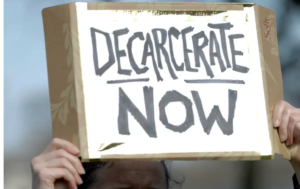
Isn’t it “under control?” Are we all just thrilled that our states and counties and cities are “opening up?” Are we looking forward to those summer parties? Making those summer travel plans? Because, you know: Flattening. The worse is behind us. Or, as the informed and deeply thoughtful members of the First Family tell us, the virus is about to “magically” disappear.
Regardless of what is happening in your community, in your state—and I hope the news is as good as it can be—please know this: Cases of the coronavirus in prisons and jails across the United States have soared in recent weeks. The number of prison inmates known to be infected has doubled during the past month. The Marshall Project reports that 46,967 prisoners have so far tested positive. Prison deaths tied to the coronavirus are up by 73 percent since mid-May.
Now, according to the national database maintained by the New York Times, the five largest known clusters of the virus in the United States are not at nursing homes or meatpacking plants, but inside correction institutions.
Of course they are.
We have heard for months that prisons and jails would be hot spots, that they are extreme high-risk environments.
They are often overcrowded, unsanitary places where social distancing is impractical, bathrooms and day rooms are shared by hundreds of inmates, and access to cleaning supplies is tightly controlled. Add to this that we have an aging (and chronically ill) prison population with limited access to health care. Oregon, my state, has one of the oldest incarcerated populations in the nation. Once behind bars, prisoners age faster than the rest of us. Health researchers estimate from 10 to 15 years faster.
The response from governors, from Departments of Corrections and from officials within prisons themselves has been inconsistent, muddled, mostly ineffective. A few states have moved forward with robust testing. Most states have not. Some states are releasing medically vulnerable prisoners; others are not. Many are stalling, arguing politics. This is not about politics. This is about health. Men and women are dying.
The crisis is now. The response must be now: testing for all; release not just for the medically vulnerable and aged but for all low-risk inmates who have served at least half of their sentences.
June 17, 2020 1 Comment
The center will not hold

The revolution will not be televised
You will not be able to stay home, brother
You will not be able to plug in, turn on and cop out
You will not be able to lose yourself on skag
And skip out for beer during commercials, because
The revolution will not be televised
The revolution will not be right back
After a message about a white tornado
White lightning, or white people
You will not have to worry about a dove in your bedroom
The tiger in your tank, or the giant in your toilet bowl
The revolution will not go better with Coke
The revolution will not fight germs that may cause bad breath
The revolution will put you in the driver’s seat
The revolution will not be televised
Will not be televised
Will not be televised
Will not be televised
The revolution will be no re-run, brothers
The revolution will be live
I am excerpting from Gil Scott-Heron’s extraordinary poem and song recorded in 1970 during a moment in time that in some ways was entirely different than now. And in some ways just the same. The poem is about racial inequality, about anger, about taking to the streets. It is about action. Change happens not from a distance. We don’t watch it on a screen. Or follow it on Twitter. It unfolds, as Scott-Heron writes, live.
For me, “live” doesn’t necessarily mean in the streets, although that is good too. Good for, as they say, “optics.” Optics are good for a news cycle or two. Or even a month or two. But what endures is what happens away from the cameras, in the trenches. In the trenches is the hard, grinding work of systemic reform, of changing policies, of enacting legislation with teeth, of reformulating budgets, of supporting and electing leaders with integrity, compassion and vision. (By that latter I don’t just mean “vote.” I mean work for–or become–a leader, a listener, a policymaker who can make a difference.)
In the trenches is where we rethink our collective definition of “to serve and protect.” It is where we do the sweaty work of confronting and learning from the past, opening our eyes (and hearts) to the present and learning to become what we are capable of becoming: A people who care about each other. An inclusive, egalitarian democracy.
Turning and turning in the widening gyre
The falcon cannot hear the falconer;
Things fall apart; the centre cannot hold;
Mere anarchy is loosed upon the world,
The blood-dimmed tide is loosed, and everywhere
The ceremony of innocence is drowned;
The best lack all conviction, while the worst
Are full of passionate intensity.
Surely some revelation is at hand…
(William Butler Yeats, 1920)
June 10, 2020 No Comments
Two ears. One mouth.
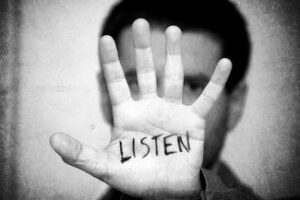
The impulse is to speak. To be outraged. To be supportive. To school others. To chime in with what we know or think we know. To use these voices that we are so accustomed to using that we have forgotten they come from privilege.
It is time to listen.
“When you talk, you are only repeating what you already know. But if you listen, you may learn something new.”
Dalai Lama
“One of the most sincere forms of respect is actually listening to what another has to say.”
Bryant H. McGill
“Instead of talking in the hope that people will listen, try listening in the hope that people will talk.”
Mardy Grothe
“Listening is being able to be changed by the other person.”
Alan Alda
“We have two ears and one tongue so that we would listen more and talk less.”
Diogenes
“Never miss a good chance to shut up.” Will Rogers
June 3, 2020 2 Comments
Own it

We have to own it.
No more railing against those other people in other places who say and do those things we cannot believe they do. No more shock about the man who golfs and tweets as the death toll exceeds 100,000. No more astonishment over the spinelessness of that man’s party. No more channeling anger into posting horrific memes and upsetting images. No more gasping at what we have become. No more paralyzing grief.
It is our country that is tearing itself apart. It is our country. It is us. Maybe we believe ourselves to be the good ones, the righteous ones, the enlightened ones, the rational ones. But we are citizens of a country that has enshrined privilege and institutionalized inequality and elected and kept in power a monster.
This country is what we have allowed it to be, what we have—maybe silently, maybe unknowingly, maybe lazily—colluded in it becoming. And now we are horrified.
It is not aliens from another planet who have, overnight, transformed medically-endorsed mask-wearing into a divisive political statement. It is not a secret army of the brainwashed who arm themselves with assault rifles and march on state capitals, who hang their governors in effigy, who flock to the beaches to revel, ass to elbow, as the virus spreads. It. Is. Us.
To quote the Turkish proverb: ‘When the axe came into the forest, the trees said, “The handle is one of us.”
These people, this president, they are us. And the sooner we realize that, the sooner we stop feeling special and above-it-all and oh-so-woke, the sooner we stop feeling smug, the sooner we can take real meaningful action. Maybe we are not part of the problem. But we sure as hell are not (yet)–not vibrantly, powerfully, whole-heartedly–part of the solution.
Let’s stop gasping and start acting.
May 27, 2020 3 Comments
The broken world awaits
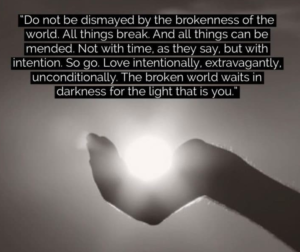
After the long weeks of baking sourdough bread and cleaning out closets and giving over our lives to zoom are history, will we be changed? Will we have been have genuinely, permanently shaken out of our everydayness?
How much of what we are learning about our country, our leaders, our communities—and most of all, about ourselves—will endure after this crisis has passed?
Will we be ready to re-think, to reach out, to take action?
I hope so. I tell myself this is possible. I tell myself…
–that the pandemic has shown us what real leadership looks like, that we do not have it in Washington, D.C. And we have an opportunity to change this in just a few months.
–that the pandemic has shown us how crucial fully vetted, authenticated, factual information is to making informed decisions. And that we owe it to the failing health of our democracy to support trusted information sources.
–that the pandemic has reminded us—in case we forgot–that the deep economic and racial inequities in our country play out in life and death. And that we can do something about this by making health care a right not a privilege.
–that the pandemic has shown a bright light on the dangerous, overcrowded, toxic warehouses we operate as prisons and jails. And that we can do something about this with intelligent, rational, fact-based, humane prison reform.
–that the pandemic has shamed us about our attitudes toward and treatment of the elderly and fragile in our midst. And that we can rethink and reform the “industry” that has been built around the warehousing of our elderly.
–that the pandemic has shown us that climate change is not an insolvable problem. The earth is resilient in a way we did not appreciate. Now we know. And we can create environmental policies with great optimism.
–that the pandemic has shown us that an emotionally and psychologically healthier way to live is to embrace internal rather than external motivation for our behavior and actions. External motivation are acts done to receive external reward (money, power, fame, the acknowledgement of others). Internal motivation is behavior done for its own sake, personally rewarding (from sourdough bread baking to sewing masks for health care workers). This inspiration, which comes from within, is more forceful. Its results more fulfilling. We’ve learned that these past two months, haven’t we?
Onward, my friends, onward.
May 20, 2020 1 Comment
What I don’t want to write about

Here’s what I do not want to write about:
>The shame of being an American when the president of your country is who he is;
>The pain of realizing the deep and painful (and very dangerous) inequities this virus has made visible to all, including but not limited to the “petri dish” of prisons, the “death trap” of assisted living, the terrible irony of “sheltering at home” for the homeless;
>The fear of living in a country so ill-prepared to take care of itself;
>The sadness of living in a country where reason, compassion and integrity are in shorter supply than PPEs;
>The anger of being captive to a moment in which everything, everything, has been transformed into an ideological battle;
And, stay with me for this last one…
>The weariness of hearing one more story, reading one more post, seeing one more pic of someone’s victory with sourdough starter.
What do I want to write about?
>The importance of three-dimensional people in one’s life (no! not holograms);
>The pleasure of a full-body hug;
>The warmth of the family around a table;
>The joy of travel;
>The not-ever-taken-for-granted-again freedom of an unmasked life.
April 29, 2020 No Comments
A virus has no politics

One of the more repulsive and terrifying things about this pandemic is how quickly it was cast (and is being played out) as a political issue.
A virus has no politics.
The decision to stay at home, to mask up when attending to essential business is not political.
The medical researchers in labs around the world working on potential vaccines are not compelled by whatever their personal political beliefs might be.
The nurses and doctors putting their own health at great risk to care for others are not compelled to do so based on whatever their personal political beliefs might be.
Yet the man who–to our great shame—is currently our president has made it into a political issue. This is not just (as so much of what he does and says and is) reprehensible. It is dangerous.
I gasp at his off-the-rails televised public briefings, at his ongoing “leadership” of the right-wing’s devaluation and dismissal of science, at the bizarre alt-right conspiracy theories concerning the origin of the disease, at the “patriot” zealots calling for taking to the streets to re-open businesses because government closures violate our constitutional rights. At preachers, spouting political rhetoric, who tell their flocks to gather en masse because god will protect the righteous.
There is no room for posturing here. Or grandstanding. Or twitter-ranting. COVID-19 and what we do now–the careful, informed, compassionate apolitical choices we make to save lives and help our communities recover–will define our humanity. The man who–to our great shame–sits in the White House has shown, in this crisis, what kind of a human he is.
We need to listen to real leaders. Like the governors of Oregon, Washington and California who issued this joint statement about planning our “comeback”:
“Health outcomes and science – not politics – will guide these decisions. Modifications to our states’ stay at home orders must be made based on our understanding of the total health impacts of COVID-19, including: the direct impact of the disease on our communities; the health impact of measures introduced to control the spread in communities—particularly felt by those already experiencing social disadvantage prior to COVID-19; and our health care systems’ ability to ensure care for those who may become sick with COVID-19 and other conditions. This effort will be guided by data. We need to see a decline in the rate of spread of the virus before large-scale reopening, and we will be working in coordination to identify the best metrics to guide this.
Public health experts like Dr. Fauci urge extreme caution about resuming normal life too soon for fear of instigating another wave of illness and death.
When to “re-open for business” is NOT a political decision.
April 15, 2020 4 Comments
Spare me the ageist bullshit
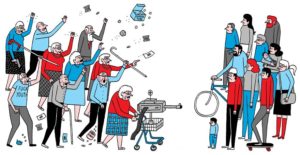
I am weary weary weary of ageism, from the I’ve fallen and I can’t get up stereotype of the frail, helpless older person to the gee-whiz look at this older person actually doing something stereotype of exceptionalism.
Now comes more ageism coupled with the current let’s find more ways to sow division among ourselves zeitgeist. In addition to (abbreviated list here) race, class, sex, gender identity, religion, geography, how about let’s plant and water and nourish the seeds of a deep generational divide. Yeah, let’s do that.
So, my fellow Democrats, we are hearing this incessant drumbeat: Bernie is supported by the young and not the old. If he wins it will be the triumph of the young people over the old people. The young are progressive and open-minded, and the old are…not.
But WAIT. Bernie is old!
And, hold on there, the older generation (dismissed lately with “Okay, Boomer..”)—tens of millions of women and men born into that generation—were the heart and soul of the many social justice and reform movements of the 60s and 70s: second-wave feminism, reproductive rights, gay rights, Black power/ empowerment, environmental action, student rights, anti-war, free medical clinics, alternative schools. The democratic socialist ideals and principles that Bernie stands for were (and continue to be) embraced by millions in this older generation. Of which he is but one example.
So, please, don’t tell me Millennials have a lock on progressive ideals and policies. Please don’t tell me the older generation is not just frail and feeble and helpless and sexless–but (gasp) conservative as well. Please don’t divide us.
Because you know who will conquer.
Oh, and by the way, as a committed and enthusiastic supporter of Bernie’s ideas, I am a Warren woman. Her politics mirror Bernie’s, but I think she’s smarter and more thoughtful. And she doesn’t constantly stab her finger at you when she talks.
February 26, 2020 4 Comments
Plantation life
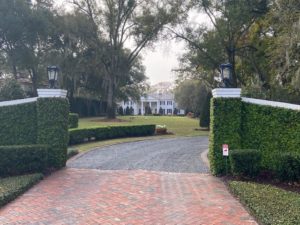
At seven in the morning, barely dawn, the air is already warm and muggy. The only sound I hear as I run past the gated mansions of Winter Park, Florida, is that of leaf blowers. The only people I see are landscapers, crews of brown and black men. The mansion dwellers have not yet emerged to begin their days as one-percenters.
I have read the statistics on income inequality. I know that America’s top 10 percent averages more than nine times as much income as the bottom 90 percent. I know that Americans in the top 1 percent average over 40 times more income than the bottom 90 percent. And the gap has gotten progressively wider. Since 1979, the before-tax incomes of the top 1 percent of America’s households have increased more nearly seven times faster than bottom 20 percent incomes,
I am not ignorant of the life lived by rich people. I have been in homes that have 200-bottle wine cellars and wood-fired pizza ovens and bathrooms crafted from more Carrera marble than Leonardo used in a lifetime. I once gave a talk in a home where all the sinks were hand-thrown porcelain bowls, each hand-painted by a different Italian artist.
I am not ignorant of the lives lived by those on the margins today. At the Food for Lane County’s Dining Room I help serve a mid-day meal to as many as 300 hungry, often unhoused people. It is sometimes the only meal they will eat that day.
I run past those mansions, those 20,000 square-foot, 8-bathroom, porticoed, colonnaded residences sitting prettily on gorgeously landscaped half acres at the end of a gracefully curving flagstone driveways. And I catch a glimpse of the men, already sweaty as they prune trees and wheelbarrow mulch and blow palm fronds into neat piles. And I imagine their wives inside standing in front of $40,000 Wolf stoves fixing breakfast for the family in the mansion, or upstairs making the beds, or hurrying to put in the first load of laundry.
Maybe it’s that Tara look-alike mansion, or that much-older African American gentleman bent over at the curb sorting the family’s recyclables. Maybe it’s the sultry air, the cloying closeness of it. But all I can think of is Plantation Life, the plantation mentality. This isn’t history. This is today. We live in a country divided more completely, more brutality, more enduringly than what we are acknowledging at this particular political moment. We live in a country divided into the light-skinned ruling elite and the dark-skinned workers. America is a plantation.
February 12, 2020 2 Comments
Happy Anniversary. Not.

Anniversaries are usually happy occasions.
This one, last month, was not.
In September we “celebrated” the 25th anniversary of the Violent Crime Control and Law Enforcement Act of 1994. It was designed as an in-your-face piece of legislation to show that Democrats could be just as “tough on crime” as Republicans.
Here’s what it did: It imposed longer prison sentences, created more death penalty offenses, cut Pell grants for education, and provided billions to states to build more prisons. It incentivized states to create three-strikes laws, enact mandatory minimums, and eliminate parole. This was supposed to reduce violent crime.
Here’s what it actually did: It created the world’s largest population of incarcerated men and women. It targeted (and devastated) Black and brown neighborhoods. It separated families, destabilized communities, further institutionalized poverty, disenfranchised voters, and created a generation of children who would grow up with one or both parents behind bars.
What it did was shred the fabric of millions of lives. What it did was bring shame to the United States, making us #1 in a category no enlightened, free, democratic society ever wants to place first in.
And what it continues to do is to fly in the face of decades of research that shows that longer prison sentences don’t work to cut down on crime, that educational opportunities are the most important part of any rehabilitation efforts, and that children whose parents are incarcerated are physically, emotionally and educationally at greater risk than other kids.
This piece of legislation does not work. Our system, does not work.
To mark this anniversary, let’s commit to serious, informed, focused conversation about deep reform of this so-call justice system. Let’s elect officials willing to work hard for actual justice. Let’s vote to spend our state tax dollars on restorative justice programs and educational opportunities not more prison cells.
Let’s do this.
If you want to know what living your entire adult life is like when you live it in behind bars, I invite you to read my book, A Grip of Time.
October 23, 2019 2 Comments





